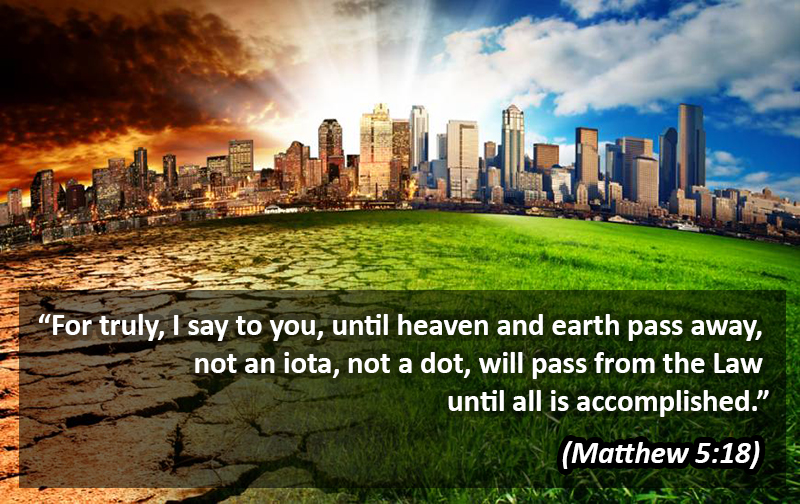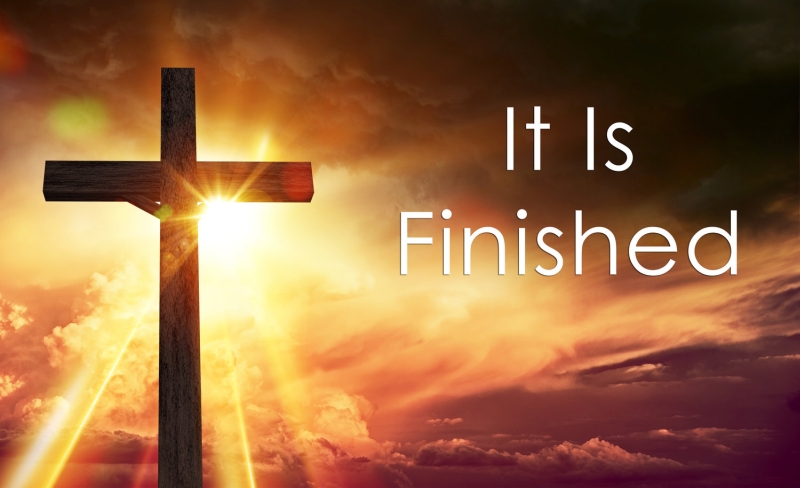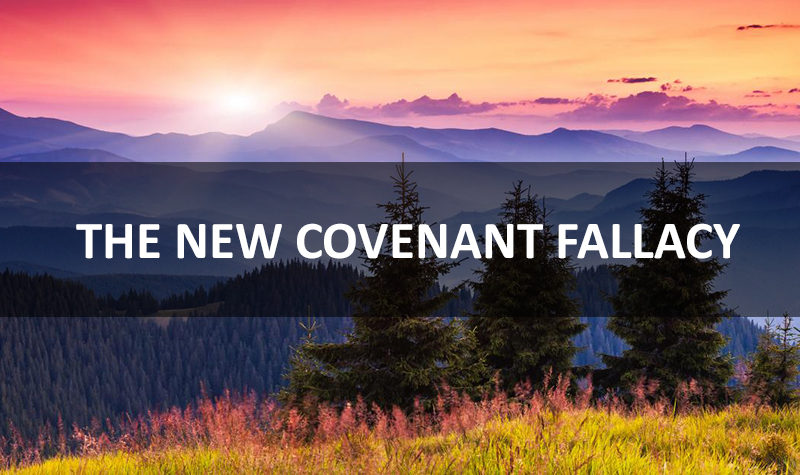Many modern churches today refer to a “new covenant”, which they claim means that there was an old covenant in the Old Testament before Christ, and then a new covenant after Christ. These teachers claim today that it means that all the laws and rules of the Old Testament no longer matter, and now only the rules in the New Testament matter. They go further to say that even the rules in the New Testament also don’t matter, and that only by grace can one be saved, and there is nothing we can do, we have no role in our salvation.
Scripture proves this is simply not true at all. While I have talked greatly regarding the fallacy of grace alone, here I will discuss the fallacy of the new covenant and how it is used as the foundation for grace alone. I will discuss how the teachers are completely wrong and do not teach what the Bible says when they say things like “the Old Covenant has passed away” or “we no longer have to follow the laws of the Old Testament”.
Let’s look at the verses which refer to the new covenant and break them down, one by one. This article is not comprehensive but covers the primary points of the new covenant.
The new covenant
The new covenant was referred to as far back as the prophet Jeremiah in chapter 31, who prophesied the coming new covenant with the coming of Christ.
30 But every one shall die for his own iniquity: every man that eateth the sour grape, his teeth shall be set on edge.” (Jeremiah 31:29-30)
In verse 29 where it states, “the fathers have eaten the sour grape”, this is a metaphor referring to their sins; and the children received the consequences of having the “teeth set on edge”, the feeling of sourness from eating something sour, like happens when you eat a sour grape. These verses are saying that the children are being penalized for their fathers’ – ancestors’ – sins.
In the new covenant, as stated in verse 30, each person shall be penalized only for their own sins, not their ancestors’ – as a person eating a sour grape, and themselves having their teeth set on edge.
Verses 31-33 go on to say,
32 Not according to the covenant that I made with their fathers in the day that I took them by the hand to bring them out of the land of Egypt; which my covenant they brake, although I was an husband unto them, saith the Lord:
33 But this shall be the covenant that I will make with the house of Israel; After those days, saith the Lord, I will put my law in their inward parts, and write it in their hearts; and will be their God, and they shall be my people.” (Jeremiah 31:31-33)
The Bible says here that the new covenant means that no longer will the people of God need to go to a priest and a temple to meet with God; instead, God will write his laws and precepts on our hearts directly, so we can know God directly.

This is strongly reinforced by the fact that upon the death of Jesus on the cross, the veil to the temple was torn, symbolizing God’s new covenant with the people.
Therefore the new covenant is not what many modern Reformed Christians like to say, that some “old law was passed away”. Rather, the law never changed, and remained the same – but now it is written directly on our hearts and we can have a direct relationship with God.
17 Do not think that I have come to abolish the Law or the Prophets; I have not come to abolish them but to fulfill them.
18 For truly, I say to you, until heaven and earth pass away, not an iota, not a dot, will pass from the Law until all is accomplished.”
(Matthew 5:16-18)
Jesus prefaced by reinforcing the importance of good works, then stated he did not abolish the law, and that He came to fulfill it. You cannot say that it was fulfilled with Jesus’ death, because Jesus then follows saying that not a single dot will pass from the law until all of heaven and earth pass away.
Until heaven and earth pass away

Jesus clearly explains that when “all is fulfilled” is when heaven and earth pass away. He also clearly explains that none – absolutely none – of the Law will be changed or pass away until the end of the universe, until heaven and earth pass away.
We know from Revelation that the time that heaven and earth pass away and therefore the completion of the fulfilling of the Law, will occur after Jesus’ second coming, when God then destroys the entire heaven and earth and rebuilds it anew:
2 Peter 3:10-13 describes the destruction of heaven and earth:
(2 Peter 3:10)
John speaking in his vision says in Revelation 21:1, “Now I saw a new heaven and a new earth, for the first heaven and the first earth had passed away.”
Here we have the final reference to the heaven and earth passing away just as Jesus described in Matthew 5:18. Therefore, we can conclude that the only time the Law will pass away is after the end of the world, not at the time of Jesus’ death like many Reformed teachers continue to teach.
Reformed teachers try to say that today, we are no longer bound to the Law, such as honoring the Sabbath. This is utterly false. Jesus Himself said that the Law will continue to be unchanging – not a dot will change – until the end of everything, when it is no longer required because the evildoers will be cast into the Lake of Fire and all whom will remain are the few whose names are written in the Book of Life, in immortal, perfect, glorified bodies, like that of the angels (see Matthew 22:30).
Therefore it is clear and evident that the “new covenant” has nothing to do with changing the Law, which will remain until heaven and earth pass away at the End.
The new covenant was clearly described in Jeremiah 31:29-24. It is that we can now have a direct relationship with God. However, rather than passing away part of the law (like the Sabbath) like many self-proclaimed Christians today teach, actually it is ever more important to follow the Law of God.
Why is it even more important? Because now, Christ and the Holy Spirit of God can dwell within us, instead of in a temple. 1 Corinthians 3:16 says, “Do you not know that you are God’s temple and that God’s Spirit dwells in you?”
When there was a temple, people would be instantly killed when they entered the temple unworthily. Now that we are the temple of God, it is therefore far more important to keep God’s Law. 1 Corinthians 3:17 says, “If anyone destroys God’s temple, God will destroy him; for God’s temple is holy, and you are that temple”.
It is finished

Some may argue that when Jesus died, he said “It is finished” (John 19:30). The word for Greek that is used is τετέλεσται (tetelestai), and is only used one other time in the Bible, just 2 verses before: “After this, Jesus knowing that all things were now accomplished, that the scripture might be fulfilled, saith, I thirst.” (John 19:28). Here, the interpretation for “tetelestai” is “accomplished” and it is elaborated that this is in reference to the fulfilling of scripture.
It is clear here that when Jesus said, “It is finished”, Jesus did not mean that everything God ever intended in the scriptures was accomplished in this act. Jesus likely meant that all his work in his human lifetime was now completed. He died, thereby ending his finite and mortal human life, to be resurrected 3 days later in his glorified and immortal body.
After all, as we read earlier in Matthew 5:18, 18 For truly, I say to you, until heaven and earth pass away, not an iota, not a dot, will pass from the Law until all is accomplished.” Jesus had already told us that “all” will not be accomplished until heaven and earth pass away.
Clearly, heaven and earth did not pass away upon Jesus’ death and resurrection. Moreover, Revelation tells us when heaven and earth will pass away, and it has not yet. Therefore, Jesus’ work on earth is not fully done and will continue until after He returns again and reigns for 1000 years.
Putting it all together
Putting it all together, God made a new covenant, which states that now, we are the new temple of God, able to have a direct relationship with God. The Law of God will remain and nothing shall change until the end when heaven and earth pass away, so especially now that we are the new temple of God, we must follow every part of the Law.
The Sabbath has not passed away with the new covenant, nor has any other Law. The new covenant does not have to do with changing even one dot from the Law, it has to do with God destroying the temple building and making us the new temple, writing his unchanging Law on our hearts, and allowing us to have a direct relationship with Him.
Christ came to fulfill the Law, but this has not been completed yet. It is Christ’s purpose on earth, but Christ has not yet fulfilled this purpose. Jesus Himself said that all will not be complete until heaven and earth pass away. Therefore, Christ’s mission to fulfill the Law will not be completed until after His second coming. Thus it follows then that still not a single dot has passed from the Law, and it will continue unchanging for all time – it will only pass away with the end of heaven and earth, when all is finally accomplished.




Since all the Law is in effect as you say, to whom do you take your sacrifice to? When do you journey to Israel to observe the feasts? Do you trim your beard or hair? Do you eat shrimp or steak? Do you work on Friday evening and Saturday? No lawn work no anything?
Remember if you’re guilty of breaking one you’re guilty of them all.
Thank you for your comment. First of all let me preface with the clarification that not all the Levitical rules are considered the law in the respect of “the law still applies”. We know that Jesus’ sacrifice made the “ceremonial law” – or better put, the ceremonial rules or rituals, out of effect. We know this because God from heaven created an earthquake that tore the veil in two. It was a sign from God that the ceremonial law is done for. We no longer have to sacrifice animals.
Do I work on Friday evening and Saturday? No! Since I learned that the Sabbath is is still a law unlike taught by many churches today, God convicted me and I began following the Sabbath. Later I learned that the Sabbath is really Saturday, and really, it is actually sundown at Friday until sundown at Saturday. So God then convicted me to follow Sabbath on Saturday, and it has been almost 2 years now. No work on Saturday! I once tried to continue building a hobby project into the Sabbath (after sundown on Friday) and God convicted me by an accident minutes later that caused me to break my finger. Lesson learned. No more hobby work on Saturday either.
Trimming beard. The main issue in the old testament was that the pagans trimmed their beard in a certain way that was in worship to their false gods. As a result, Israel was commanded not to have this practice. This wasn’t to say they had to never shave their beard or never cut it. Rather, it was not to cut it in a certain way that worshiped other gods or emulated the other pagan worshipers. God was saying that He didn’t honor that type of thing and did not respect it and commanded that Israel not do it. As far as I know, there is no such precedent today. So I do not feel convicted by God to look like a homeless man by never trimming my beard – although, I do not cut it into any fancy lines or such, I just keep it neat.
Steak? There was never a law against steak. Against blood, but not against steak. I do not eat blood. In fact, the red in steak when cooked medium is not blood. Look it up. It is a myth. It is red, but not blood. (Do not eat rare steak though which I believe does have blood). I always eat medium-well and will not eat a bloody steak. As for shrimp, firstly I do not eat any seafood, certainly not shrimp. Bottom feeders like shrimp, crab, and catfish are, frankly, unhealthy. A better question would be whether I eat pork. Well, again this was a certain law that was not part of the 10 commandments. I will not make an assertion on this matter but I can say that I have not been convicted by God not to eat pork. If God convicts me, then surely I would refrain.
However, we do know that this one precept about food, which by the way was not part of the 10 commandments, was possibly nullified by Mark 7:19 “Because it entereth not into his heart, but into the belly, and goeth out into the draught, purging all meats?” Granted, the second half of the verse is an addition (God declared all foods clean) and is not found in the King James Version. However, the verse does seem implicit. Again, if God convicts me about it then I would certainly forfeit bacon. However, I actually found bacon to improve my health, not to harm it. Check out the bacon diet. Uncured no-nitrate bacon can be used for weight loss, I know this by experience. It may be besides the point but why would God allow my health to improve by eating bacon if God didn’t want me to eat any? It is possible that pork, among others, were harmful because of unsanitary practices from ancient peoples, and God prevented disease by eliminating potentially dangerous foods. However, today due to technology advancements, such foods – some of them – can be eaten safely. (Others like shrimp or catfish are still unhealthy.) I still avoid harmful foods for health reasons and because I believe God wants me to take care of this body He created for me.
As far as journeying to Israel to honor feasts. Actually if I had a clear picture on when the feasts were I would like to celebrate them – although I do not believe we have to journey to Israel because Israel was destroyed in 70 AD. None of the early church did or even could journey to Israel. Today there is an new land called Israel but I will not get into this in this comment. I have been researching to try to find some information on the specific dates but it is extremely challenging to find any accurate info. I would have to do some serious academic research to discover this as many people say conflicting dates. Moreover, the only ones who honor the feast days, as far as I know, the seventh day adventists (they have the seventh-day part right, but I believe they are wrong in many areas), so unfortunately there is no one for me to celebrate with if even I did know the days. Do I think God commanded it to be continued? Perhaps, but due to the lapse of time and the loss of knowledge, I do not believe that God will punish someone for something they cannot know. The Bible says that sin only comes by the law, without the law there is no sin (Romans 4:15). If you cannot know the law then you cannot sin against it. However, the law we do know for certain is the 10 Commandments, including the 4th, so we must follow all 10 of those.
If you think that you continuing to live in sin thinking that “He will remember our sins and Lawless deeds no more” including your future sins done in knowing violation of God’s laws (like not honoring the Sabbath), you are going to have a big shock coming on Judgment Day! Remember Hebrews 10:26 “If we deliberately keep on sinning after we have received the knowledge of the truth, no sacrifice for sins is left”!